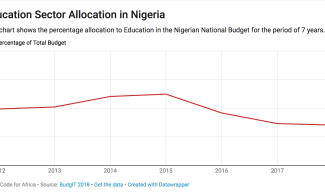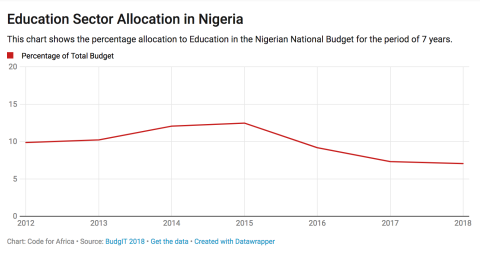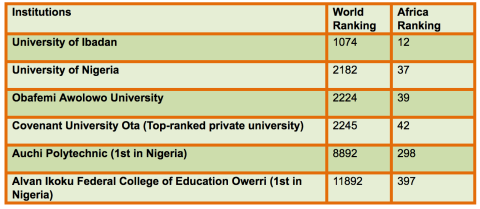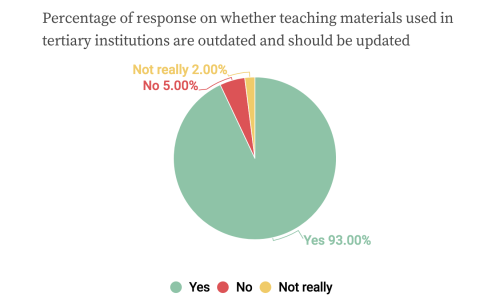
“Our lecturers need to move with the world and stay up to date with other international institutions. If we continue to use what students from other ‘centuries’ have used, it will greatly affect the quality of education in our country," one of the students said.
Achieving quality education is hinged on so many variables, from funding to the person passing on the knowledge.
However, trouble looms when the person who is to pass on the knowledge is dishing out outdated knowledge.
This is the case with Nigeria's education system, as many lecturers in tertiary institutions in the country are not up-to-date in terms of new innovations, inventions and happenings in various fields of learning.
Meagre funding has also accounted for some of the problems affecting quality education in Nigeria.
The money allocated to funding education in the country since 1999 has not been sufficient to maintain the standard of education in the country, hence leading to the fall in quality of education.

Inadequate funding can be characterised in poor remuneration of staff, which has led to various strike actions by teaching and non-teaching staff, lack of maintenance of facilities and lack of teaching aids.
In the 2018 budget, which was passed recently by the Muhammadu Buhari-led administration, only 7% was allotted to education — government allocated N435.01 billion (recurrent expenditure) and N61.73 billion (capital expenditure) to the education sector.
When compared to other sectors, budgetary allocation to education is one of the lowest.
According to an April 2018 report by Vanguard Newspaper, Nigeria has a total of 311 tertiary institutions. Data has shown that very few of these institutions can boast of having up-to-date teaching materials for all their courses.
This has greatly contributed to the factors responsible for the poor quality of education in the country. This has also reflected in rankings of tertiary institutions in the country when compared to other institutions in Africa and the world.

In a survey conducted among Nigerian students in different tertiary institutions across the country, 93 per cent of them concluded that the quality of education is substandard while agreeing that teaching materials used by lecturers contribute to the low quality of education.
Also, it was gathered that most of the academic materials used in teaching in Nigerian tertiary institutions are outdated.
59 per cent of the students, who were part of the survey conducted, stated that the materials used by their lecturers were published between 1991 and 1999, while 20 per cent maintained that the materials were published between 1970 and 1990.
On the other hand, 21 per cent noted that the materials used by lecturers in their institutions were recently published and are up-to-date.

A 200-level student of the Federal University of Technology Akure, Ondo State, stated that most of the textbooks and teaching materials used by lecturers in the institution were printed as far back as 1990 and had not been updated since it was first printed.
“Most of our textbooks are outdated, especially the ones we used in previous sessions. They are all outdated.
“Our lecturers need to move with the world and stay up to date with other international institutions. If we continue to use what students from other ‘centuries’ have used, it will greatly affect the quality of education in our country.”

A 300-level student of the University of Ilorin said some departments in the school do not have up-to-date teaching materials, making particular reference to the Department of Economics.
He said: “All of our textbooks and handouts should be updated, especially in the Economics Department of the University of Ilorin. Most of the lecturers' teaching materials are far outdated.”
Christian Odozi, a 300-level student of Delta State University, however, noted that he is a beneficiary of up-to-date teaching materials.
He urged lecturers to ensure they stay updated and acquaint themselves with new ideas and technologies.
“Well in my school, I don't think the lecturers use outdated materials to teach us.
“Using outdated material to lecture in tertiary institutions may serve as an obstruction to the students when it comes to innovations as outdated materials would not, in any way, contribute to the social and the physical growth of students in the tertiary institutions," he said.
A student of Auchi Polytechnic, Edo State stated that some of the lecturers in the school use textbooks printed in the 1980s, and also supported that "the textbooks should be updated to meet current trends".
A lecturer of the University of Lagos, who spoke on the use of such outdated materials said: "I have been a lecturer since 2006 and, of course, we use academic materials that are published before the year 2000.
“These outdated academic materials in tertiary institutions are not useful in universities due to the rapid rate of technological advancement in the world today."
He, however, recommended that lecturers should infuse current curriculum in their teaching, as he does for his students.
“For example, at the Department of Architecture, University of Lagos, we include the knowledge of Computer Aided Design (CAD) and Building Information Modeling (BIM) in the academic curriculum to enhance the quality of knowledge and understanding in all courses," he said.
Similarly, a Professor at the Benue State University urged his colleagues to periodically update their teaching materials, adding that lecturers who are in the education department must always ensure they remain updated to improve the standard and quality of education in the country.
“Scholarly materials are basically journal articles and books and of course, these must be up to date,” he said.
Contributing, Dr Austin Nweze, a lecturer at Pan Atlantic University stated that academic materials long published are still relevant, but must be updated as things change.
“As things change, new discoveries are happening every day. We discover that in academics, especially in the sciences where Artificial Intelligence (AI) is trending, students should be made familiar with this knowledge.
“Also, economics principles from the 1960s are no longer relevant in present day economics, which is why these new innovations must be taught and transferred to the students.”
Students and lecturers from various universities also called for more attention to be paid towards education at the tertiary level, with a focus on improving the quality and standard of education at this level.
This story was produced with support from Code for Nigeria via its WanaData programme
